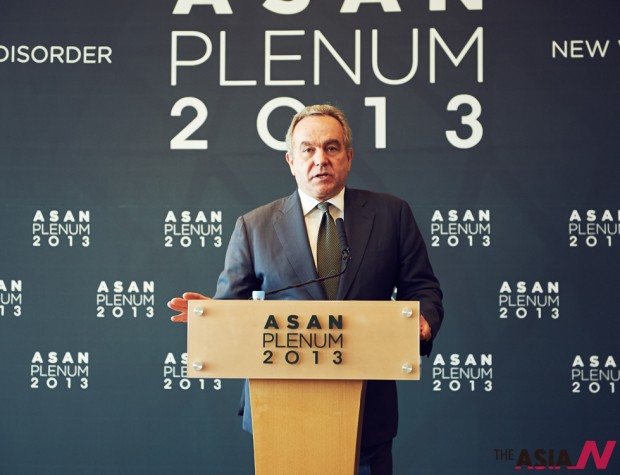
The Gaeseong Industrial Complex, being the most recent issue at stake, was the subject of conversation but turns out a failure in leading North Korea to an open country, Kurt Campbell, former assistant U.S. secretary of state for East Asian and Pacific affairs, stated.
During the ‘Asan Plenum’ forum hosted by the Asan Institute for Policy Studies from April 30 to May 1 in Seoul, Campbell said that Gaeseong was not a serious “watershed” event as he stressed the difficulty of constructing diplomatic solutions with the communist state.
“I don’t think what is taking place in Gaeseong marks a watershed in the way the shelling of Yeonpyeongdo and the sinking of the (corvette) Cheonan did in the past. The accumulation of basically serial provocations has caused a quiet rethinking in a variety of capitals about just how difficult it is to construct any engagement strategy with North Korea that could bear fruit,” he said.
“I think it’s important in the current environment not to rush to judgments. It’s very difficult to make sweeping conclusions about what this means for the way ahead for the interaction between South Korea and North Korea and what’s important is a certain steadiness,” he said.
Campbell, who is credited for devising the U.S. diplomatic policy of rebalancing Asia-Pacific called ‘pivot to Asia,’ emphasized China’s role for more effective international pressure on the North to behave as a responsible member of the international community.
On the premise that the U.S. has been a clear stabilizing force in Asia for decades and wants to continue playing that role, the U.S. has perceived Pyongyang’s nuclear and missile developments as posing a serious security threat to the U.S., he noted.
He pointed out that China has shown a shift in strategic thinking on North Korea. A series of recent provocations from North Korea has led to an apparent realignment in Beijing’s strategic thinking about its ally, he said, stressing the crucial role of China to rein in Pyongyang.
“A lot of the pivot is diplomatic, a lot of the pivot is economic, only some of it has to do with the military and defense posture. When American officials talk about the pivot or rebalance, they never ever talk about it as something directed against China,” he told in a press conference.
“What we have seen is a subtle change in the approach in Beijing with respect to North Korea. It is clear that they are voices inside China that are beginning to realize that North Koreans’ activities are deeply antithetical to China’s interests,” he added.
Although he did not expect a full-fledged change in Chinese thinking about the North, Campbell, who now leads the consulting firm Asia Group, added China’s diplomacy would change in some way.
“I think China’s diplomacy will shift in tone and texture more toward some of the dialogues China traditionally had, shall we say, with the Philippines, Vietnam and now Japan when they are unhappy – a slightly tougher tone,” he said.
“I think the most important first step is these tougher steps and potential sanctions actually signal very clearly to China that their own interests are at risk here. I think the first persuasion is not to Pyongyang but to Beijing,” he said.
“Some put the blame on the lack of creativity, inventiveness or determination in Washington or Seoul for the lack of progress in engagement with North Korea. I think that completely overlooks serial destabilizing provocations that North Korea has taken against us that led to a loss of life, higher nuclear tensions and proliferation concerns,” he said.
The Asan Plenum 2013 held under the theme “New World Disorder” provided the discussions on the addressing of conflicts over history in East Asia, the relationship between China and ASEAN and the question of how North Korea’s neighbors might deal with a collapse of the regime.


